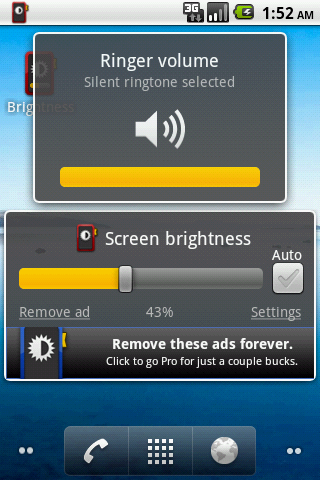Android Apps by Nikhil Bhatla
Email: android@superfacts.org
Blog: nikhil.superfacts.org
Brightness Rocker
"Control Screen Brightness From Any App"
|
|
|
| Brightness Rocker Lite Free web download or Free Market download Ad-supported Some feature limitations 

|
Brightness Rocker Pro $1.99 on the Android Market or email me Ad-free No feature limitations 

|
|
What is Brightness Rocker and why might I want it?Brightness Rocker empowers you to control your screen's brightness from any Android app. Just press the volume rocker buttons to display a brightness slider (in addition to changing the volume). Alternatively, you can use the Brightness Rocker home-screen widget or notification icon to view and change screen brightness.What versions of Android does Brightness Rocker work with?Brightness Rocker will run on Android 1.5-2.2. Brightness Rocker is optimized for Android 2.2 and works best there. It also works with Android 1.5-2.1, but has several issues. First, it can take several seconds to appear after the volume pop-up has disappeared. Second, you actually have to change the volume to trigger it - if the volume is maxed out and you just click up on the volume rocker, it will not show the brightness control. Note that the notification icon and home widget work normally in 1.5-2.1; it's just the volume rocker triggering which isn't as good as in 2.2.What Android phones does Brightness Rocker work on?[If a phone isn't listed below, that just means that it hasn't been confirmed to work (though it should)] The app has been tested and works well on the these phones: The app has been tested and works with minor issues on these phones: What's new in this release?Version 1.2 (Oct 1, 2010)Version 1.1 (Sep 23, 2010) Version 1.0 (Sep 22, 2010) - Enable (on/off) - Trigger with volume buttons (on/off) - Trigger on ringer volume change (on/off) - Trigger on media volume change (on/off) - Trigger on in-call volume change (on/off) - Display notification icon in status bar (on/off) - Set time delay before dialog disappears (default is 5 sec on Lite, 2 sec on Pro) What permissions do I give the app when I install it?Brightness Rocker requires various permissions primarily to improve the user experience and to help eliminate bugs. Secondarily, the Lite version requires certain permissions to provide more relevant advertising. Details are provided below. If this is a concern for you, don't hesitate to email me (android@superfacts.org) to let me know.
Who helped in the making of this app?Special thanks to Dave and Jude for getting me an Android programming book for my birthday, Nick for lots of testing with Android 2.1, my Android buddies for late-stage beta testing, and Becca for putting up with me. |
|
Send questions, comments, bugs and feature suggestions to android@superfacts.org